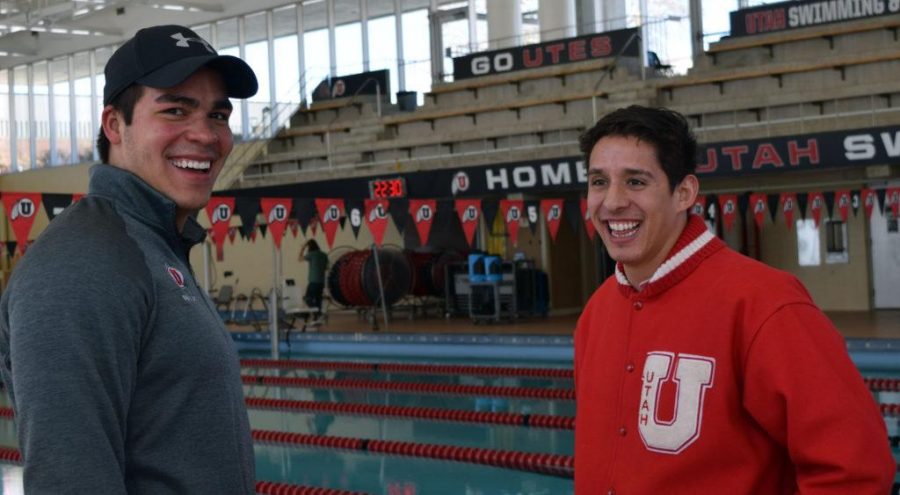One phrase University of Utah swimmer Luis Macias never thought he would hear while walking to class was, “Go back to where you came from!” Originally from Aguascalientes, Mexico, Macias came to Utah to further his education and swimming career, and only days after Donald Trump was elected president, Macias heard those words.
Macias though, has never felt like an outsider. He is in the United States on a student visa, and while he doesn’t know who yelled at him to go back to his country, he says this incident was out of the ordinary, and it didn’t affect him as much as someone might think.
“I never felt like a minority in the United States,” Macias said. “I never felt oppressed before Trump’s campaign. I mean, there is always that one person that is going to talk bad about your people, but besides that, I never felt oppressed.”
Sophomore swimmer Fernando Cervantes has had similar experiences but in the past hadn’t taken them as seriously. He thought of them as mostly jokes from friends and forms of interaction. Now, however, he is begnning to understand the underlying severity.
Macias initially thought Trump was bluffing when Trump first announced he was running for president. Not only did Macias assume the costs of a wall would be high but he also didn’t think it wouldn’t stop immigration. All it would be is a fancier wall. Macias added that Trump’s plan to run the country like a business won’t work, because he thinks there is more to this country than just a financial side — there are people to consider, too.
Cervantes never thought Trump would follow through on his promises either and thought Trump was only saying those things to get elected. Now the reality is setting in.
“There is an International Student Service Building, and they just sent messages to international students to avoid traveling outside of the United States, because if something happened we wouldn’t be allowed back in,” Cervantes said. “It sucks for the people I know that are affected from it.
In one of his first executive orders as president, Trump signed an order for the purpose to “protect the nation from foreign terrorist entry into the United States,” as explained by the Office of Press Secretary in a press release. This lead to the restricted travel from seven Muslim-dominate countries: Iran, Iraq, Libya, Somalia, Sudan, Syria and Yemen.
After being struck down by the U.S. Court of Appeals for the Ninth Circuit a week later, some people hoped the ban would be put to rest. At the beginning of March, Trump signed a new executive order with the same implications, but Iraq was not on the list. Macias wonders what will stop Trump from extending the ban to Latin American countries.
“Right now, it is just those six countries, [but] what countries are going to be next?” Macias adds,“his relationship with Mexico is fragile right now. So right now it’s just those six, but then it’ll be Mexico, and then all the Latin American countries because he thinks all the rapists and drug cartels come from there so he will try to ban all of us.”
Cervantes doesn’t think that will happen though. The Migration Policy Institute reported that 3.5 percent of the workforce in the U.S. are Mexican migrants, so Cervantes thinks that if Trump decided to close its borders to Mexico, not only would it hurt Mexico but it would hurt the U.S. as well.
“Mexico is a huge business partner to the U.S.,” Cervantes said. “That will just start a trading war and it won’t be beneficial for either country.”
According to the Press Office, this wall will be “monitored and supported by adequate personnel so as to prevent illegal immigration, drug and human trafficking and acts of terrorism.”
While Cervantes thinks it’s a little extreme, he wouldn’t mind if the wall was built, but believes that it will not be seen well by his culture.
“If you have a neighbor and you put a wall between you and your neighbor, and say that if they cross it, you’ll shoot them, you aren’t going to have a good relationship with your neighbor,” Cervantes said. “The relationship with Mexico is crumbling.”
Trump stated Mexico will pay for the wall directly, or through funds from higher tariffs on imports but Cervantes and Macias find irony in this. Trump can raise taxes on goods exported from Mexico, but Cervantes and Macias think U.S. citizens will end up paying. The Washington Post estimates that the cost of the wall will be close to 25 billion dollars.
“There are so many people in Mexico that say that they will pay tomorrow and that tomorrow is never,” Macias said.
The future for Macias is uncertain. He planned to stay in the U.S. after college, and he had aspirations of learning how to work for an American company. He then wanted go back to Mexico and apply what he had learned there but now he has no idea what he is going to do.
“My visa expires this summer, and I need to renew it, but I don’t know what will happen,” Macias said. “I was going to go home for spring break, but my dad was afraid that if I went home, I may not be able to go back to the U.S.”
For Cervantes though, he will continue to do what he loves to do, and that’s traveling. Since high school, Cervantes has been studying abroad. He started off in Canada, finished high school in Washington and now he’s in Utah for college.
“I just want to learn new cultures, make new friends and challenge myself,” Cervantes said. “Now, it still hasn’t changed. Something I have learned in these past years is that a president cannot do everything he wants.”
@emileewhiteee

















